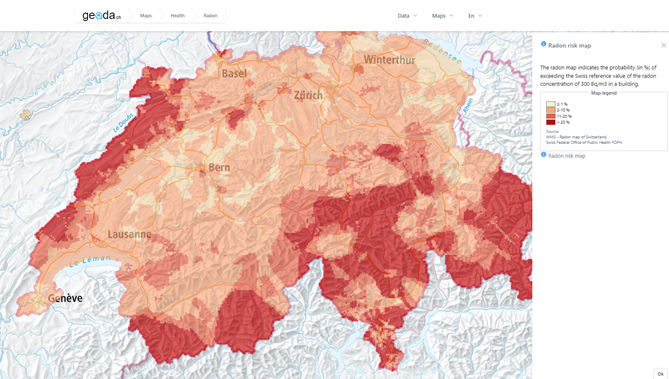Geoda.ch
Radon and your health
Elevated radon concentrations in indoor air can harm your health and lead to cancer. Radon kills an estimated 300 persons annually and is the second most significant cause of lung cancer in Switzerland after smoking. A Geoda.ch housing report gives you information on the most significant risk factors for radon contamination for all Swiss addresses.
Radon is an odorless, invisible, and radioactive gas produced from the decay of naturally occurring uranium in the ground. Radon can seep into homes and buildings through small cracks or holes in the subsurface, and its gaseous form can have significant negative health effects.
The geology of Switzerland means that the risk for radon pollution is relatively high throughout the country, and especially in the more mountainous regions (see map below) - Radon ought therefore to be a major concern for Swiss homeowners, homebuyers, landlords, and building managers. It is estimated that Radon is the second leading cause of lung cancer in Switzerland, second only to smoking, and responsible for 200-300 deaths a year1.

Map showing the risk of radon pollution in Switzerland. The map data is provided by the Swiss Federal Office of Public Health (FOPH)2.
The World Health Organization (WHO) recommends that its member countries have a national annual average residential radon concentration reference level of 100 Bq/m³ (Becquerel per cubic metre). According to WHO, the risk of lung cancer increases by about 16% per 100 Bq/m³ increase3. The Swiss reference level is three times higher than the WHO recommendation at 300 bq/m³. The risk map (above) and the risk analysis is based on the relatively high Swiss 300 bq/m³ reference level. The maximal indoor radon concentration set down in Swiss law is a very high 1,000 bq/m³.
Radon protection measures
If you're uncertain about the radon risk in your living space, we recommend following the three-step plan below: "check", "measure", and "protect". This will help safeguard you and your loved ones from the dangers of radon exposure..
- Check radon risk on your address. It's simple to assess the radon risk at your home, workplace, child's school, or any other address of interest. Enter the address into the Geoda.ch search bar to receive a housing report, that includes a radon risk evaluation. Additionally, you can obtain a risk estimate from the Swiss Federal Office of Public Health (FOPH) website4. Keep in mind that, these are merely 'risk estimates' and don't provide information on the actual radon levels at the specified address.
- Measure radon in your home. It is a good idea to measure your home for radon regularly, especially if you live/work at an address with elevated risk. The radon risk is particularly high in basement and ground-level rooms. Radon infiltrates the interior of a building through leaks in floors and walls in direct contact with the soil, so basement and ground floor levels . Something called the stack effect causes a suction effect in the winter in particular. Heated air rising within the house causes the air pressure in the basement and the lowest floors to drop by a barely perceptible amount. The ensuing suction effect, amplified by fans or fireplaces, causes radon and other gases to be drawn into the upper stories unless the basement and ground floor are sealed off with airtight doors. The Swiss Federal Office of Public Health (FOPH) makes available a list of recognized radon measurement stations to purchase and evaluate dosimeters 4. The costs are a modest 70 to 100 Swiss francs.
- Protect yourself from radon. There are several ways to reduce radon levels in indoor spaces, including sealing cracks and openings in the foundation, installing a radon ventilation system, and using a radon-reducing soil treatment. A radon-proof new building with a sealed foundation slab is estimated to cost an additional 2000 Swiss francs per single-family dwelling; a radon rehab runs about 4,000 to 8,000 Swiss francs.
“There are straightforward, low-cost means available to protect a building from excessive radon exposure.”

In summary, it is crucial to consider radon and health in your place of residence. Given the significant health risks posed by radon in Switzerland, and also considering that there are straightforward, low-cost means available to protect a building from excessive radon exposure. We strongly recommend to always include radon risks, when making decisions on purchase of real estate or moving into a rented property. .